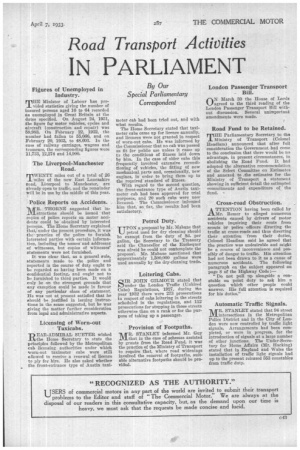Road Transport Activities
Page 65

If you've noticed an error in this article please click here to report it so we can fix it.
IN PARLIAMENT
By Our Special Parliamentary Correspondent
Figures of Unemployed in Industry.
MIIE Minister of Labour has pro vided statistics giving the number of insured persons aged 16 to 64 recorded as unemployed in Great Britain at the dates specified. On August 24, 1931, the figure for motor vehicles, cycles and aircraft (construction and repair) was 59,983. On February 22, 1932, the number had fallen to 55,666, and on February 20, 1933, to 48.603. In the case of railway carriages, wagons and tramcars, the corresponding figures were 11,733, 12,274 and 14,000.
The Liverpool-Manchester Road.
TWENTY miles out of a total of 26 miles of the new East Lancashire road, Liverpool to Manchester, are already open to traffic, and the remainder will be in use by the middle of this year.
Police Reports on Accidents.
R. THORNE suggested that in
structions should be issued that copies of police reports on motor accidents could be obtained by interested persons. The Home Secretary explained that,. under the present procedure, it was the practice of the police to furnish interested parties with certain information, including the namesand addresses of witnesses, but copies of witnesses' statements were not furnished.
It was clear that, as a general rule, statements made to the police and reported in the course of duty ought to be regarded as having been made on a confidential footings and ought not to be furnished to third parties. It would only be on the strongest grounds that any exception could• be made in favour of any particular class of statement. He was not at present satisfied that he should he justified in issuing instructions in the sense suggested, but he was giving the matter further consideration from legal and administrative aspects.
Licensing of Worn-out Taxicabs.
-DEAR-ADMIRAL SUETER wished Ili the Home Secretary to state the principles followed by the Metropolitan cab licensing authorities under which worn-out taximeter cabs were still allowed to receive a renewal of licence to ply for hire. He also asked whether the front-entrance type of Austin taxi
meter cab had been tried out, and with what results.
The Home Secretary stated that taximeter cabs came up for licence annually, and licences were not granted in respect of worn-out cabs. He was informed by the Commissioner that no cab was passed as fit for public use unless it came up to the conditions of fitness laid down by him. In the case of older cabs this frequently involved extensive reconditioning of vehicles, the fitting of new mechanical parts and, occasionally, new engines, in order to bring them up to the required standard of fitness.
With regard to the second question, the front-entrance type of Austin taximeter cab had been approved for trial purposes, and 20 such cabs were now• licensed. The Commissioner informed him that, • so far, the results had been satisfactory.
Petrol Duty.
T TPON a proposal by Mr. Mabane that
petrol used for dry cleaning should be exempt from the duty of 8d. per gallon, the Secretary to the Treasury said the Chancellor of the Exchequer was afraid he could not contemplate the proposal. Mr. Mebane mentioned that approximately 1,500,000 gallons were used annually by the dry-cleaning trade.
Loitering Cabs.
SIR JOHN GILMOUR stated that under the London Traffic (Uehired Cabs) Regulations, 1927, during the year 1932 there were 273 prosecutions in respect of cabs loitering in the streets scheduled in the regulations, and 112 prosecutions for stopping in those streets otherwise than on a rank or for the purpose of taking up a passenger.
Provision of Footpaths.
iurR. STANLEY informed Mr. Guy In that in the case of schemes assisted by grants from the Road Fund, it was the practice of the Ministry of Transport to require that, where road widenings involved the removal of footpaths, suitable alternative footpaths should be provided. London Passenger Transport Bill.
OMarch 30 the House of Lords agreed to the third reading of the London Passenger Transport Bill without discussion. Several unimportant amendments were made.
Road Fund to be Retained.
.THE Parliamentary Secretary to tha Ministry of Transport (Colonel Headlam) announced that after full consideration the Government had come to the conclusion that there would be no advantage, in present circumstances, in abolishing the Road Fund. It had adopted the alternative recommendation of the Select Committee on Estimates and annexed to the estimates for the Ministry of Transport a statement showing in sufficient detail the estimated commitments and expenditure or the fund.
Cross-road Obstruction.
A TTENT ION having been called by
Remer to alleged numerous accidents caused by drivers of motor vehicles inquiring their route from scouts or police officers directing the traffic at cross-roads and thus diverting their attention from their duties, Colonel Headlam said he agreed that the practice was undesirable and might be a source of inconvenience and possibly of danger to traffic. His attention had not been drawn to it as a cause of numerous accidents. The following paragraph on the subject appeared on page 8 of the Highway Code :—
" Do not pull up alongside a constable on point duty to ask him a question which otber people could answer. His full attention is required for his duties."
Automatic Traffic Signals.
iurR. STANLEY stated that 94 street IN_Lintersections in the Metropolitan Police District and in the City of London were now controlled by traffic light signals. Arrangements had been completed, or were in progress, for the introduction of signals at a large number of other junctions. The Under-Secretary for Home Affairs (Mr. Hacking) stated that in England and Wales the installation of traffic light signals had up to the present released 553 constables from traffic duty.












































































































